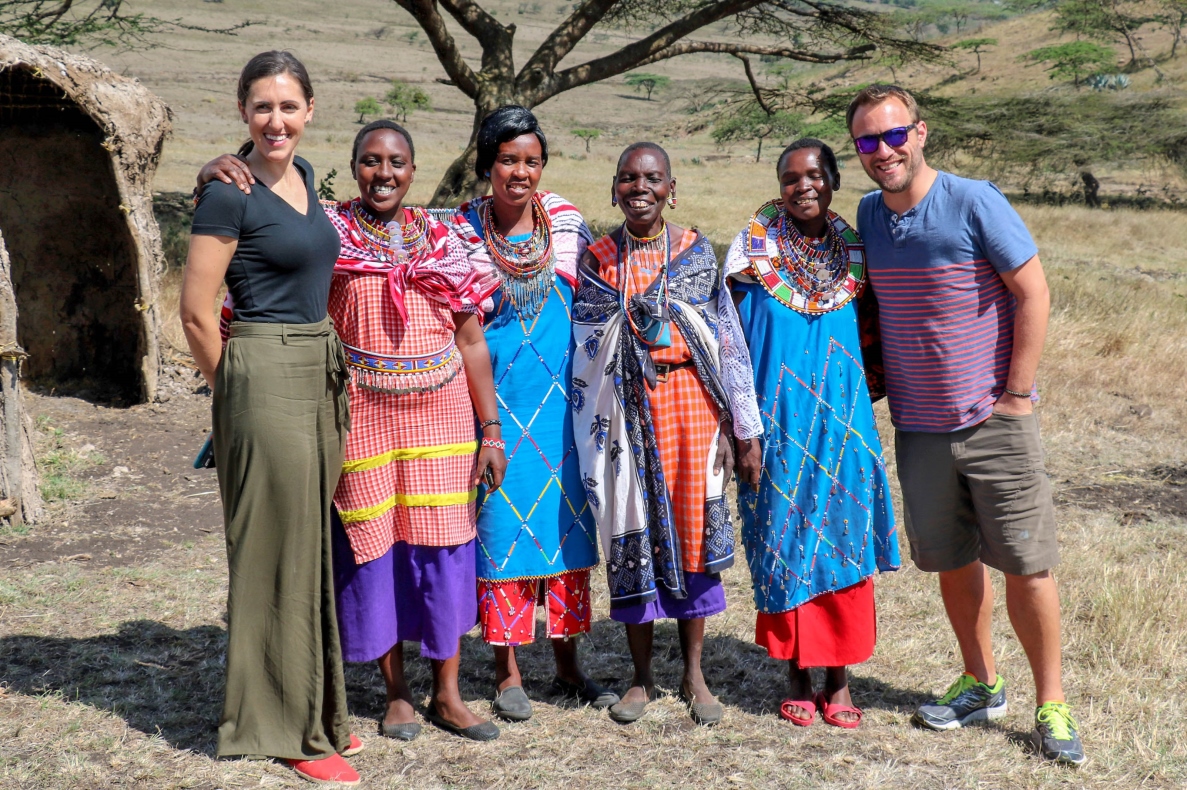
For many travellers, the people of Kenya have been whittled down to iconic images: extravagantly beaded Maasai dancing across the pages of National Geographic, and impoverished women and children featured in appeals for donations. But who are these people, really?
Urban Adventures’ Resilient Women of Kenya tour offered us the chance to immerse ourselves into the real lives of the women who call Nairobi home. The experience broke down barriers and defied stereotypes, so that by the end of the day we felt like friends rather than tourists.
Our Kenyan guide from the local non-profit One Horizon (which receives all net proceeds from these tours) whisked us away to the outskirts of Nairobi to visit the Women’s Empowerment Centre that they support. We were barely out of the car before the women greeted us with joyous singing! Our nervousness gave way to camaraderie as we danced with them, exchanging names and hugs as we made our way into the center.

A warm welcome from the women of Kenya | Photo by Emily Scott
Over coffee and tea, these impressive women shared their stories with us. Their tragedies were similar: HIV status discovered, husbands disappeared, families turned their backs, leaving them to abruptly plummet into abject poverty. But they also shared similar survival stories: Each had somehow been discovered by Mary, the humble but tenacious Kenyan social worker who saw a need among Nairobi’s women and took it upon herself to address it.
Mary runs an 18-month program that provides a path for women to lift themselves out of poverty. “We nurture their talents day in and day out,” she says – including everything from psychosocial support to intensive skills and business training. In the building where we sat together sharing stories, vulnerable women transform themselves into business owners and community leaders. Here you’ll find no simplified caricatures of impoverished Kenyans, but rather proud, self-sufficient women who embody everything that this nation truly is.

Getting to know the Maasai women of Kenya | Photo by Emily Scott
We would gladly have spent all day talking with these inspiring ladies, but we still had another stop to go. So we hugged our goodbyes and continued away from the city, breathing fresh air as we climbed into Nairobi’s rolling, green Ngong Hills.
On the outskirts of Kenya’s swiftly developing capitol, we found Maasai families living much the same way they have throughout their history. Again we had trepidations. Though we love to learn about cultures vastly different from our own, we are constantly wary of exploiting or exoticizing local communities.
We needn’t have worried. We were again greeted with song, the Masaai ladies welcoming us with a whirlwind of beaded jewelry, brightly patterned fabrics, and dazzling white smiles. Before long we all gathered into a traditional Maasai home – a small, one-room structure of mud, sticks and thatch. Bowls full of miniscule, colorful beads appeared before us and our new friends set to work teaching us to make our own simple bracelets. The ladies giggled at our clumsy attempts to copy their detailed beadwork, and gently guided our hands through the process.

Time for a beading lesson | Photo by Emily Scott
As we beaded our bracelets, our hosts shared their stories with us. They welcomed questions about Maasai culture with seemingly no topic off-limits, and we reciprocated by telling them about our lives in America. They laughed when they learned that my husband would be arrested for taking another wife, and our preconceived notions were challenged when they told us that they wanted their daughters to marry for love. No longer were the Maasai a fascinating tribe to read about from afar. They were individual women who had welcomed us into their homes.
As travellers who prefer to explore off the beaten path and avoid crowds at all costs, we’re not often enthusiastic about guided tours. But when our day with Nairobi’s women came to an end, we only found ourselves wanting more. To us, these are travel’s sweetest rewards: The moments we find ourselves sitting around a table with people who could not be more different from us, and realizing how similar we actually are.